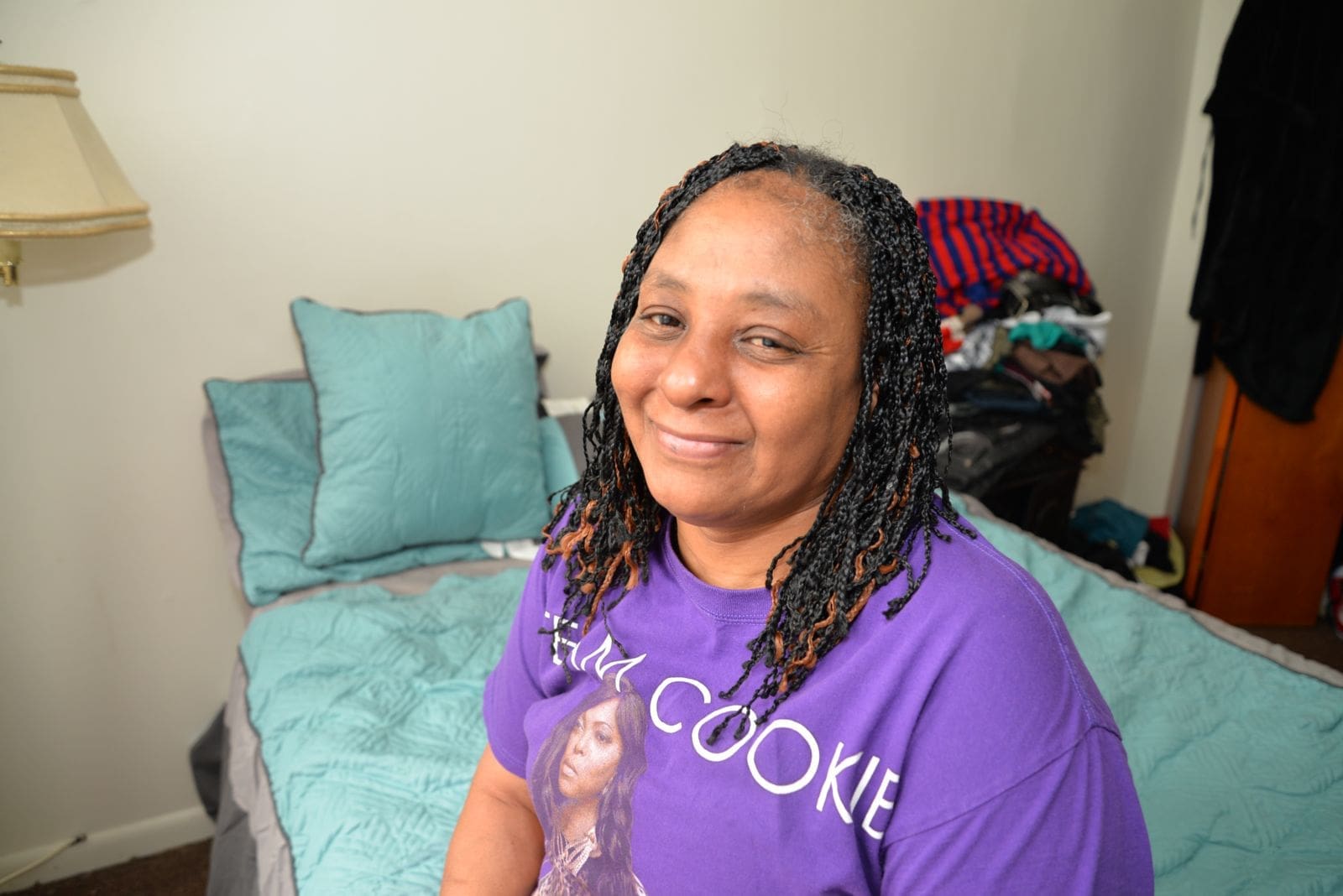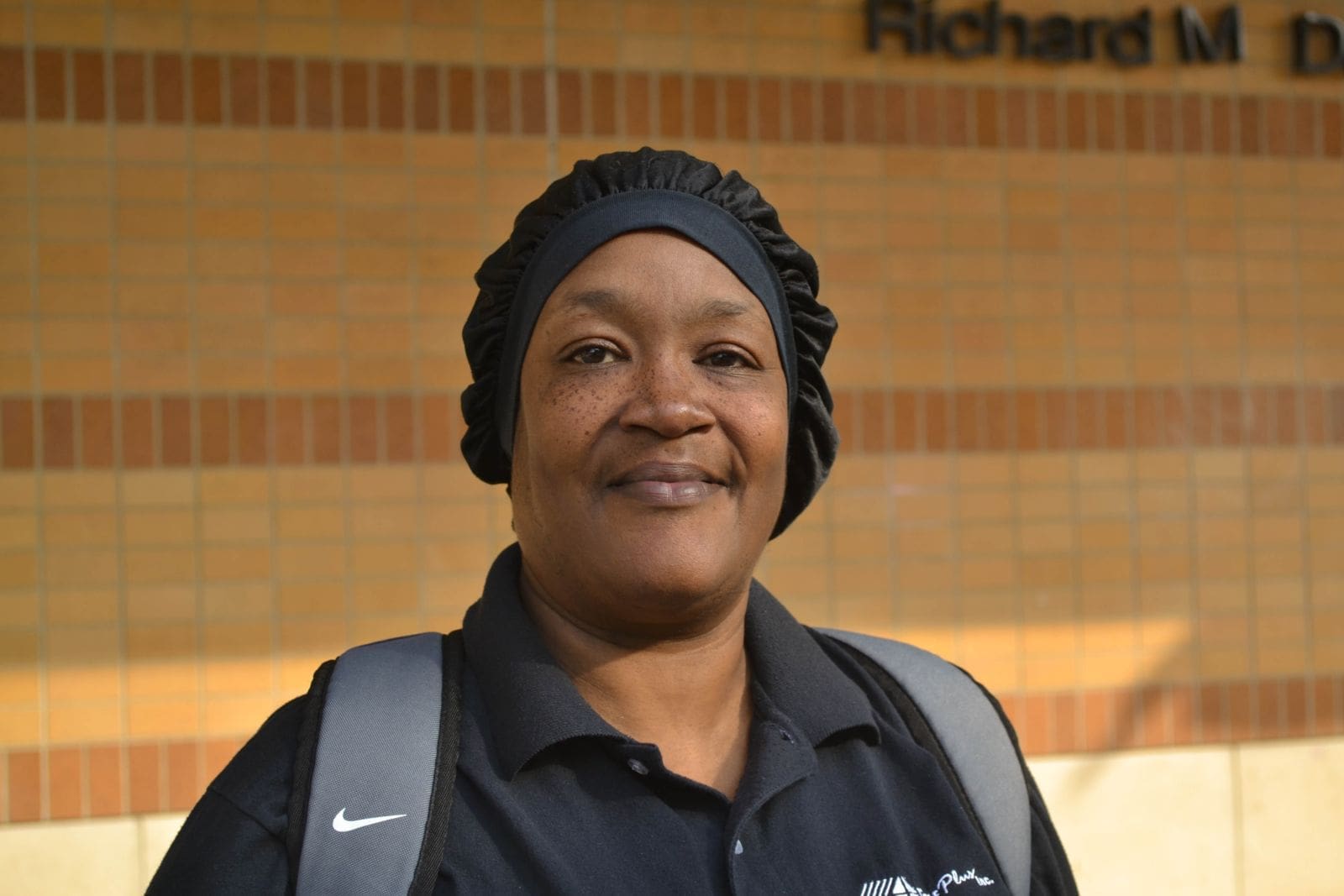by Eryn MacNeil
 The apartment is dimly lit, but spacious. There isn’t much decoration, but it’s well-kept. It’s a short walk up in a neat brick building on a tree-lined street. Today, the shades are drawn, but on the weekends the apartment is filled with children. Jeanette Thomas spent several years being homeless, battling addiction, and was recently diagnosed with breast cancer, but she is now in stable housing and in treatment.
The apartment is dimly lit, but spacious. There isn’t much decoration, but it’s well-kept. It’s a short walk up in a neat brick building on a tree-lined street. Today, the shades are drawn, but on the weekends the apartment is filled with children. Jeanette Thomas spent several years being homeless, battling addiction, and was recently diagnosed with breast cancer, but she is now in stable housing and in treatment.
Despite all this, she is able to look towards the future and concentrate on the small things that make her happy, like visits from her cousins’ children – all of whom call her Grandma – or spending time with her best friend, Amber. Jeanette is one of around 500 formerly homeless people with chronic diseases living in AFC-supported housing. Numerous studies over the past two decades have shown the importance of stable housing in overall health and life outcomes. Permanent supportive housing for highly challenged homeless populations has proven to be a cost-effective intervention that significantly reduces more expensive alternatives (that is, emergency rooms, hospitals and jails).
Where Jeanette has been
Jeanette, 48, had been sober for 14 years when she relapsed. When she got back into drugs in 2012, she started drinking, too. Before long, she found herself jobless and living on the street.
“It was terrible,” she says. “I didn’t know where my next meal would come from, where I would sleep that night…it was really bad.”
It was an arrest for drug use that caused her to enter a shelter. She was placed on house arrest, but didn’t have anywhere to go. She entered Safe Haven, a homeless shelter, and entered recovery again. When her house arrest was completed, she decided to stay and pursue getting housing and help.
Just when it seemed like things were turning around, another setback: Jeanette was diagnosed with breast cancer. The diagnosis caused her new outlook to waver. “I was diagnosed in November, and in surgery by February. But I was still in a homeless shelter. I couldn’t walk, couldn’t move, and it was depressing. I started going to counseling, and one of my therapists asked me to write an essay on what I would do if I had three days to live. I couldn’t do it. I had just been diagnosed with cancer.”
 Jeanette knew from personal experience what the outcome looked like for her. Her mother passed away from breast cancer in 1999. “When I was in the hospital, and they told me I had breast cancer, my first thought was that this was what my mom died of. When my mom died, I was still pretty deep in my addiction. I didn’t take care of her.” Jeanette had been close with her mom, and this was still hard on her. In addition, her aunt was recently diagnosed with breast cancer as well. “She’s had one of her legs removed. She’s had a stroke as well. On my worst days, I look at her and I see my future.”
Jeanette knew from personal experience what the outcome looked like for her. Her mother passed away from breast cancer in 1999. “When I was in the hospital, and they told me I had breast cancer, my first thought was that this was what my mom died of. When my mom died, I was still pretty deep in my addiction. I didn’t take care of her.” Jeanette had been close with her mom, and this was still hard on her. In addition, her aunt was recently diagnosed with breast cancer as well. “She’s had one of her legs removed. She’s had a stroke as well. On my worst days, I look at her and I see my future.”
Soon, though, Jeanette had a ray of hope that allowed her to feel more positively about her future – she was able to move into an apartment, thanks to assistance from AFC. She joined AFC’s Access to Care program, an in-home substance use counseling program, because with recent stresses she was feeling tempted to drink again. “I never faltered,” she says. “But it was on my mind a lot, that if I had a drink I would feel better.”
Since Jeanette was in the Samaritan program (a housing program for chronically homeless people with an HIV diagnosis or a disability), she qualified for Access to Care counseling. Barriers that could otherwise prevent Jeanette from seeking substance use treatment, like her physical exhaustion from cancer treatments, are not an issue, because ATC clients are able to meet with their case managers in locations they are comfortable with, like a McDonalds, or their case managers can even come to their homes if necessary. Entering therapy and case management gave Jeanette another new outlook.
“That’s one thing I’ve been trying to fight – not thinking about dying, thinking about living.”
Now, Jeanette is able to reflect on how far she’s come, and how far she could still go. “Every time I put my key in this door, I feel grateful, because I still remember the times when I wasn’t sure where I was going to sleep at night. I had friends that would let me sleep in their basement, or I would sneak into their apartment buildings. Sleep was the hardest thing, especially when I was cold. It’s hard when you don’t have anywhere to go. It’s amazing, the difference that can come from having somewhere to stay.”
 Where Jeanette is going
Where Jeanette is going
When asked how many pills she has to take each day, Jeanette dumps an armful of bottles of medication onto the table. In addition to her cancer medications, of which there are ten or twelve, she takes a number of medications for the side effects of cancer treatment ranging from folic acid to muscle relaxants. She was recently diagnosed with high blood pressure, which is another daily pill. She has been diagnosed with depression, which is another pill, and so on. The medications are better than suffering from the full effects of the cancer, but don’t provide a great quality of life. She can’t work, and is often too tired to take advantage of opportunities. “I used to work all the time,” Thomas says. “When I relapsed, I had two jobs. I was a manager at Jimmy John’s and I worked at Pepe’s Tacos. I started working transporting cars, too. I love working. That’s why I feel so hindered now. I’m too tired to work, and too sick. I’m the type of person who would be working all the time if I could. The pills make my eyes too blurry to drive, which is what I really like to do. A big goal of mine is to eventually be able to go back to work.”
While being able to go back to work is one of her big goals, another is to be able to spend more time with her nephew’s and cousins’ children. “I relapsed, and I didn’t know the babies. Now I’m getting to know them again. They were here this weekend, and I made myself get up and do things with the kids. They make me happy. As long as they’re around, I’ll be okay.” Most weekends, Jeanette has a full house of children running around. It’s often loud, and she’s often tired, but she doesn’t mind.
She shared some of the lessons she’s learned since she has gone through her struggles, and throughout the struggles she is still enduring: “Don’t give up. There’s a better life out here for you. Addiction is a disease; it’s not your fault, and it’s not permanent. It’s a disease you’ll have for the rest of your life, but you don’t have to let it rule you. Call people when you feel down. Don’t push people out of your life, because you need support. You can’t do it alone. You need someone to do this with you.” Jeanette has friends who aren’t as far along in their journeys as she is, and they routinely call her for advice and help. She says they call her to check up on her as well, now that she’s sick. Some of her best friends have come from the days she spent on the streets and at Safe Haven. “I’m an outgoing person, I’m goofy, I like to have fun. I love my family, and I love to love. I love to share what I have with people who have less than me, because I know what it feels like to be there. At the end of the day, all I want is to be happy. I’m tired of not having dreams. I’m going to make myself happy, but I know it’ll still take a lot of help.”
These days, Jeanette is taking small steps towards having the kind of life she always wanted. She is surrounded by children, family and friends, and has recently started volunteering at Deborah’s Place, the organization that oversees the Safe Haven shelter and is a partner of AFC’s Access to Care program.

